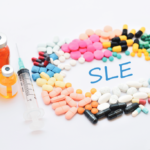PHILADELPHIA—On Saturday, Nov. 12, at ACR Convergence 2022, Joan T. Merrill, MD, director of clinical projects in the Arthritis & Clinical Immunology Program at the Oklahoma Medical Research Foundation in Oklahoma City, gave a presentation on the future of drug development and treatments for systemic lupus erythematosus (SLE). She described how an in-depth understanding of…








